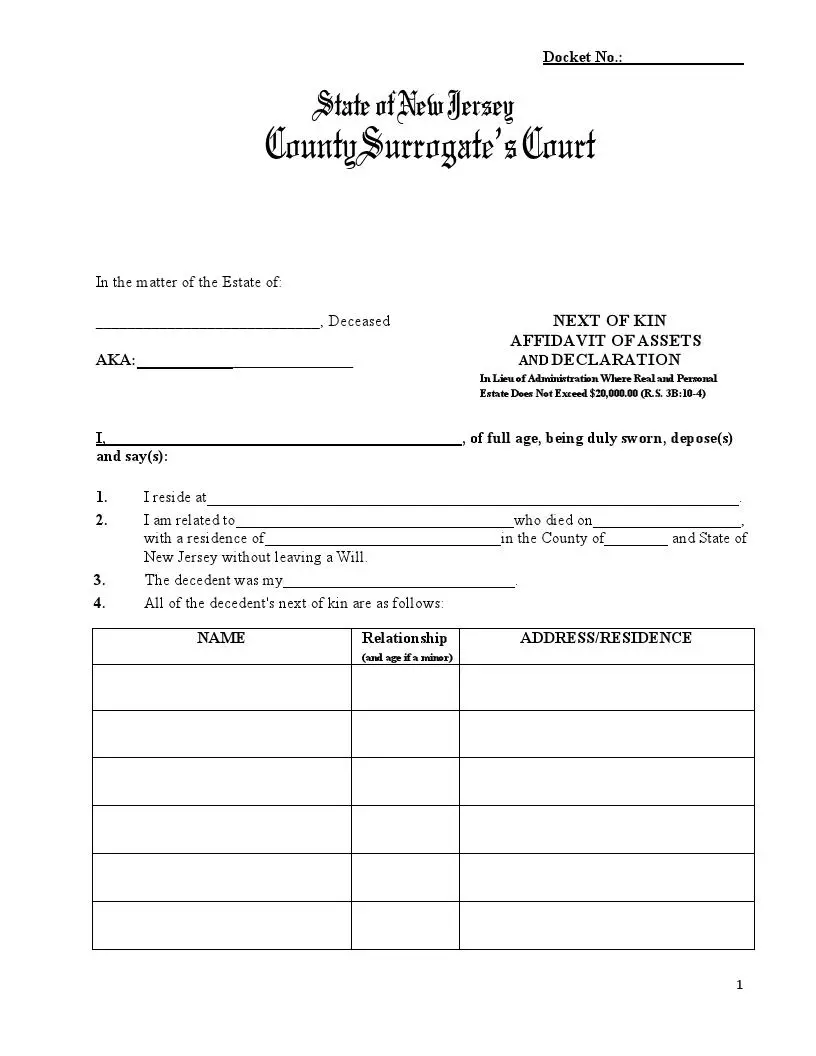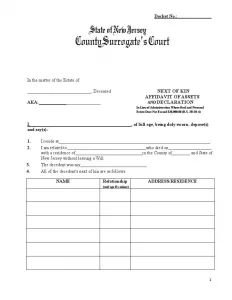New Jersey Small Estate Affidavit Form
The New Jersey small estate affidavit form is also referred to as “Affidavit of Assets and Declaration.” It is a document signed when one wants to claim a deceased person’s estate while avoiding the complicated and time-consuming court probate procedure.
No one expects to die soon, so cases of people dying without a will are common. In some cases, they deliberately refuse to write a will. This is where a small estate affidavit comes in.

Build Your Document
Answer a few simple questions to make your document in minutes
Save and Print
Save progress and finish on any device, download and print anytime
Sign and Use
Your valid, lawyer-approved document is ready
If a New Jersey resident passes away without leaving a will, the heirs can claim the estate left behind using a small estate affidavit form. Normally, the form is not used when the deceased person has left a will declaring how the estate should be shared.
The name “Small Estate” means the property item (either real or personal) has limited value. The dead person is the“decedent” in the affidavit form while the person filling out the form is the “affiant” or “claimant.”
The New Jersey small estate affidavit form is two pages long. Below are the required details in the form:
- Personal information about the decedent and the affiant
- The total amount of property items (cash, bank accounts, motor vehicles, stocks, bonds, security deposit, and other elements)
- Signatures of the affiant and a notary agent, and the date of the execution
The New Jersey small estate affidavit form must be signed by a notary public agent.
New Jersey Laws and Requirements
Keep in mind that before completing the form, you should scrutinize and understand the specific requirements related to the process. A New Jersey resident can find all relevant laws in Section 3B of the New Jersey Statutes. The name of the Section is “Administration of Estates—Decedents, and Others.”
According to §3B:10-3 and §3B:10-4, how you are related to the decedent will determine the maximum value of the property you’re allowed to claim. If you’re the decedent’s spouse, you cannot claim a property item with a value of more than $50,000 using this form. Any other legal claimant can use the form to claim property worth up to $20,000.
New Jersey statutes do not specify how long one should wait to claim the deceased person’s estate after the demisse. Therefore, one can file an affidavit immediately after death.
New Jersey Small Estate Affidavit Laws Details
| Max. Estate | $50,000 (for spouse) and $20,000 (for heirs) |
| Min. Time to Wait After Death | Not specified (may vary by county) |
| Filing Fee | $50 |
| State Laws | New Jersey Statutes, Sections 3B:10-3 and 3B:10-4 |

We provide an array of major New Jersey templates to anybody looking for convenience when handling various papers.

Filling Out the New Jersey Small Estate Affidavit Form
After understanding all rules, proceed to fill out the document. The guidelines below will help you overcome every difficulty when completing the paper.
Download the SEA Template
Use our form-building software to download the file you need and do not forget to print it out to append signatures. It is recommended that you give copies of the document to all parties involved.
Name the Decedent
At the top of the document, write the name of the deceased person.

Provide your Details
The form begins with a blank line where you (as an affiant) are supposed to write your full name as proof that you agree with the statements that follow. In the first statement, write your residential address.

Write the Decedent’s Details
Clarify how you are related to the decedent. Then, write the decedent’s full name, the date they died, and their former address of the deceased, including the city, street, and county.

Name Other Heirs
If you are not the only one who is entitled to the property, write the full names of other heirs. Remember to write their addresses and specify the type of relationship with the deceased person.

Describe the Assets
List the decedent’s property items and their worth.. At the bottom of the list, enter the total amount of the items.

Sign the SEA Form
Place your signature only after you have provided the required information and checked its validity.

Notarize the Affidavit
In New Jersey, like in most states, it is compulsory to notarize a SEA form. Therefore, after signing the document, ask a notary agent to acknowledge and seal it.
